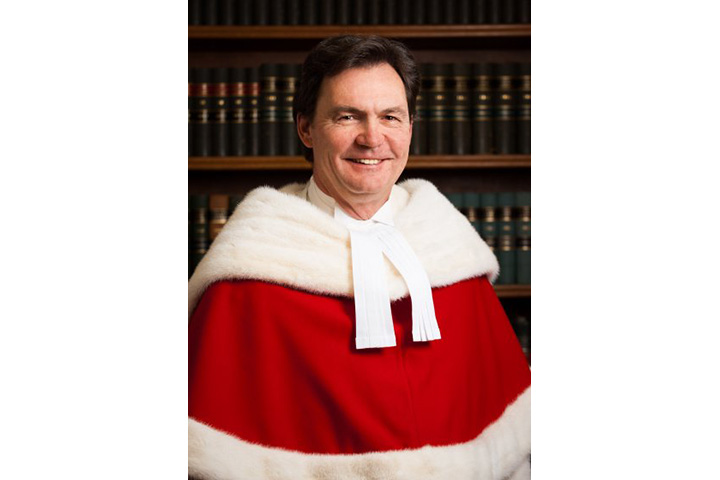Hail to the new chief justice of the Supreme Court of Canada — Justice Richard Wagner, replacing the outgoing Beverley McLachlin, who served in the position for 17 years.

Here’s what McLachlin had to say about her successor: “I congratulate Justice Wagner on his appointment to this important and challenging role … Justice Wagner is a distinguished jurist and a person of deep integrity. I am confident he will lead the court with wisdom and skill.”
Wagner is 60 years old, a former commercial litigator and bilingual. He was appointed to the bench in 2012 by Prime Minister Stephen Harper. He is from Quebec, so his appointment respects the unwritten convention that sees the chief justice position alternate between the country’s civil and common-law systems. McLachlin hailed from the common-law jurisdiction of Alberta, so her successor was always likely to be someone from Quebec, which maintains three spots out of nine on the court.
Likely — but not definitely. Former prime minister Pierre Elliott Trudeau broke with tradition in 1984 when he named Justice Brian Dickson (originally from Saskatchewan) to succeed Bora Laskin (from Ontario). But Trudeau Sr. previously had offered the position to the senior Quebec justice on the court, Jean Betz, who turned it down for health reasons.
In similar fashion, many court-watchers speculated that his son, PM Justin Trudeau, might disregard the tradition of alternating between common and civil law judges — but for entirely different reasons. Speculation started in November when Trudeau was set to fill McLachlin’s soon-to-be-vacant seat, which by tradition would be held by a judge from western Canada. Some thought Trudeau would use the occasion to appoint the court’s first-ever Indigenous Supreme Court judge. Mary Ellen Turmel-Lafond, Saskatchewan’s first female Aboriginal judge, was rumoured to be a strong contender for the post.
This could have presented Trudeau with an opportunity to score another first — by immediately elevating the new appointee to the position of chief justice, a position never held by a person of First Nations origin. That would have been a break from tradition on two fronts; chief justices of the Supreme Court are generally elevated from the court’s current bench, not appointed from outside.

Get breaking National news
When Trudeau named Sheilah Martin from Alberta to fill McLachlin’s shoes, talk of an Indigenous chief justice ceased and attention turned to the other members of the court in contention for the top job. The Quebec justices were relative newbies, however; Wagner was appointed just five years back and Clément Gascon and Suzanne Côté joined the court only three years ago.
This brought the conversation around to the most senior Supreme, Rosalie Abella. Abella is a former appellate court judge appointed to the High Court in 2004. She’s the first Jewish woman to be elevated to the court and is known for her feminist and left-leaning interpretations of Charter rights. She’s also very open (for a judge) about expressing her opinions publicly. At a recent commencement speech given to Brandeis University in Massachusetts, she jumped into American domestic politics with both feet:
“Here we are in 2017, barely seven decades later, watching ‘never again’ turn into ‘again and again,’ and watching that wonderful democratic consensus fragment, shattered by narcissistic populism, an unhealthy tolerance for intolerance, a cavalier indifference to equality … (There is also) a shocking disrespect for the borders between power and its independent adjudicators like the press and the courts.”
While Abella didn’t name the United States or U.S. President Donald Trump, many took her comments (made before an American audience, remember) as a criticism of the president’s attitude towards jurists and of the American political climate in general. All of which might have made her a bit of a lightning rod, at a time when Trudeau’s government is trying to renegotiate NAFTA and deal with a White House that is, to put it mildly, unpredictable and easily provoked.
But that wasn’t the main strike against Abella. As soon as her name hit the headlines, Quebec MPs, legal scholars, and newspapers began not-so-gently reminding Trudeau of “l’alternance” — the principle whereby chief justices traditionally alternate between French and English Canada.
“We think it’s very important that we have this alternance, by having for a time a civilian chief justice, followed by a common-law chief justice,” MP Denis Paradis told Le Devoir. The Montreal Bar Association was more blunt: “The next Supreme Court must come from Quebec.” And Quebec Justice Minister Stephanie Vallée sent Trudeau’s office an official message: “The recognition of the specificity of Quebec’s legal tradition must (…) be illustrated through the appointment of the judge to lead the Supreme Court by the Prime Minister of Canada.”
Trudeau was listening and acted accordingly. Considering Canada’s dual legal system, it was the right thing to do; politically, of course, he didn’t have much choice. Quebecers were still smarting from the recent defeat of an NDP private member’s bill which would have mandated that Supreme Court justices be bilingual.
WATCH BELOW:
Then there was the fiasco of the appointment process in 2014 when the Harper government tried — and failed — to appoint Federal Court Justice Marc Nadon to the High Court, despite the fact that he didn’t qualify as a Quebec appointee. That led to a new process which took into account the wishes of the Quebec government on future Supreme Court appointments from the province.
With a Quebec provincial election set for October 2018 and a federal vote due a year after that, Trudeau had no interest in irritating Quebec City — by inflaming nationalist passions against Philippe Couillard’s Liberal government or, worse yet, his own.
Thus, tradition triumphed — and Wagner got the job.
Tasha Kheiriddin can be heard between noon and 2 p.m. ET on Global News Radio 640 Toronto. She’s also a columnist with Global News and iPolitics.ca, where this piece first appeared.














Comments